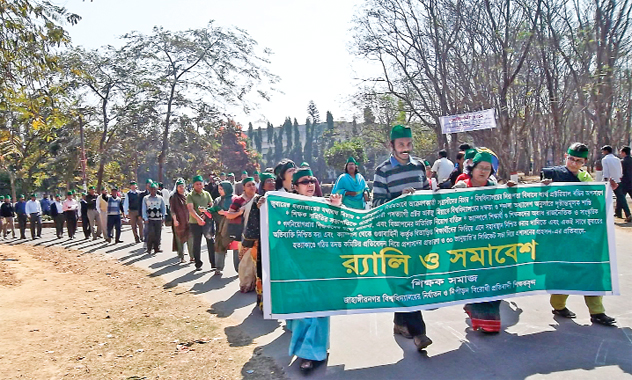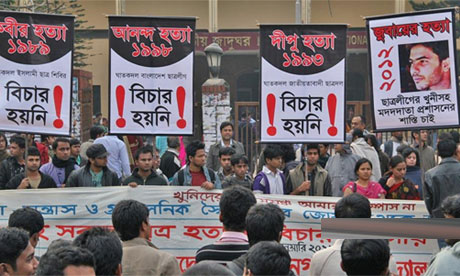by rahnuma ahmed

Is it an exaggeration to speak of Jahangirnagar university’s vice-chancellor professor Sharif Enamul Kabir as a `godfather’?
Press reports of the last one and a half years doesn’t incline one to think so. They strongly indicate, as do protests by students and teachers, that the VC provides protection to criminals. That he has violated every possible rule regarding teacher recruitment and promotion (to other posts, as well). That he has built up a regime where his ‘henchmen’ — students, teachers, administrators — located at every tier, maintain control over the campus through a combination of violence and the disbursement of favours.

Tales of corruption, violence and nepotism that are unfolding at Jahangirnagar are not new to public universities, particularly not in the last two decades of elected government (“electoral autocracy” according to Nurul Kabir, “parliamentary dictatorship” in the words of Syed Abul Maksud). Given the strong tradition of political dissent upheld by public universities, the take-over, assertion and maintenance of control over campuses have been crucial to political party rule (1991 onwards). Vice-chancellors play a central role; what matters far more than scholarship or academic stewardship is the VC’s allegiance to the ruling party’s leadership. What matters most is his ability to concentrate power, to let it flow unidirectionally through a coterie of teachers, blind adherents of those in power, and the student wing of the ruling party, armed to the teeth, whose criminal activities enjoy political cover and administrative patronage.
The autonomy of public universities, which conscientious teachers and students had fought for during the politically turbulent 1960’s, which had led to universities being separately targetted by the Pakistan army in the very first hours of the genocidal campaign unleashed on March 25, 1971, which had been safeguarded by parliamentary acts post-independence — lie in tatters at our feet. It has been vilely abused by ruling political parties, but also, just as significantly, onslaughts have been resisted on occasions by courageous souls. As is occurring presently at JU, which had earlier led the way in resisting sexual harassment and campus rapes. The faculty are now protesting against what I regard as a prime example of the Awami League-isation of a university. Of an administration, which is led by a `godfather’ VC.
While the occupation of campuses through the muscled take-over of student dormitories, the placement of toadying vice-chancellors (selection, not election), ensuring that elections to the teachers association and academic bodies (syndicate, senate, dean) are disposed towards the ruling party — all, in order to ensure control over campus/student politics, these tendencies are not particular to the present regime. What is peculiar to this rule, however, is the factionalism in the current ruling party’s student wing: widespread, pervasive, prone to violence, publicly evident ever since the Awami League came to power (January 2009). Internal conflicts within the Bangladesh Chatra League (BCL) has led to clashes, often armed, on most university and many college campuses. It has led to sine dies, to injuries, to deaths.
While cut-throat factionalism and ensuing scandals in the Awami League’s student wing — forcibly evicting tender competitors, extortion, admission trade (bhorti banijjo), sexual harassment, rape, land-grabbing etc. — led the prime minister to step aside from BCL’s organisational leadership in April 2009 (not that it lessened BCL’s thuggery noticeably), as parliamentary elections draw nearer (2013), one witnesses changes in government-speak. While speaking at the BCL’s reunion recently, Sheikh Hasina advised its leaders and members to remain vigilant “against any plot that hampers the march forward of democracy” (News Today, February 5, 2012). Farcical, given that the BCL is currently one of the biggest threats to democracy on campuses. Much worse, because the prime minister presumably knows it.
The situation in Jahangirnagar is unique par excellence as the VC has, by all accounts, extended his patronage to a particular faction of the BCL, that too, in a situation where no committee of BCL-JU exists officially. He has done it nakedly. Aggressively. Sections of the media to refer to it as the “VC League.”
It is compounded by the fact that BCL’s (national) central committee has no control over this faction of the League, it being run by the vice-chancellor himself. The Godfather.
Professor Sharif Enamul Kabir is from Gopalganj, the prime minister’s home district, as are many others who have seemingly received special blessings, have enjoyed (still do) extra impunity. As had Parimal Joydhar, Viqarunnisa school teacher, accused of raping a student, later, forced to relinquish his post, arrested, under trial — but only after weeks of student and guardian protests. His colleagues maintain, he’d boasted of going scotfree because of his magical Gopalganj connection.
How did this state of affairs come to be? The BCL unit of JU was formed on May 20, 2010. According to media reports, students close to the VC, some from Gopalganj as well, did not receive committee posts they’d expected. They left campus but, insist Rashedul Islam Shafin (president, BCL-JU) and Nirjhor Alam Shammo (general secretary, BCL-JU), began stoking conflicts from outside campus. Clashes ensued, the university authority expelled 23 students including Shafin and Shammo. The central committee of BCL-JU expelled 13 members; it suspended all organisational activities indefinitely. Large numbers of leaders and cadres left campus fearing arrest. Into this vacuum stepped Niamul Pervez, one among those who hadn’t received an expected post; stepped Azgar Ali, who’d been expelled from JU (see photo 2, yesterday’s column, eating cake, literally, out of the VC’s hand). They took control of JU campus, supported by Nurul Alam Choyon and Khairul Bashar Raju, both of whom had been expelled from BCL central. A chain of events which have given rise to the couplet, Chatra League kore bohishkar, VC kore puroshkar (Chatra League may ban, but VC remains a fan). (Golam Mujtaba, “Jabi VCr biruddhe pokkhopatitter obhijog,” Jugantor, January 31, 2011).
On December 4, 2010, when the prime minister’s education affairs advisor Dr. Alauddin Ahmed inaugurated the newly built Shaheed Rafiq-Jabbar Hall, Niamul and Azgar were introduced as acting president and acting general secretary of BCL-JU respectively, in the VC’s presence.
In January 2011, then-JU proctor Arju Mia, who’d accosted leaders and members of the Shameem-Sharif faction to Bangabandhu hall to “settle” them in, was chased away by Shafin-Shammo’s cadres because “Sharif was armed.” Hall provost Abdul Mannan Chowdhury, assistant proctors Kabirul Bashar and Najmul Hasan Talukdar too, fled only to return with the cadres later, bolstered by police presence (Kaler Kantho, January 2, 2011; blogger Abid Azad, January 20, 2012). Since then, Jahangirnagar’s BCL has been run by Azgar Ali from Moulana Bhashani Hall, and by the Sharif group from Bangabandhu Hall.
Press reports also maintain, the “BCL faction [allegedly] responsible for Zubair’s murder [received] JU administration’s patronage” (Daily Star, January 16, 2012). That, the VC had tried to save his VC League by saying, “I don’t believe Chatra League could do such a thing.” That, after students locked up the VC from noon till evening on January 9, 2012, demanding that Zubair’s killers be caught and punished, he was “rescued,” allegedly by those who had committed the killing (and police), chanting slogans, VC tomar bhoy nai, rajpoth cchari nai (VC don’t be afraid, we are here to stay) (Prothom Alo, January 17, 2012).
Continued student protests after Zubair’s killing forced the JU administration to file a murder case with Ashulia police station on January 9. Three JU students were named ? Ashikul Islam, Rashidul Islam and Khan Mohammad Rais ? along with 10 to 12 unnamed, for their alleged involvement (The Independent, February 1, 2012).
The VC claims Zubair was not killed because of “political infighting.” A “gang of criminals killed Zubair” to create “anarchy“, thereby fulfilling the wishes of “a section of teachers [who are] against the institution’s interests” (Daily Star, January 11, 2012). He insists, he had not “backed” any BCL faction. Continuing protests forced JU authorities to expel 7 students for life (including above 3), 6 others for 2 years. All 13 are BCL activists (Who was it who’d said he didn’t believe Chatra League could do such a thing?). But JU students and teachers demand that the contents of the probe report, which was headed by pro-vice chancellor, professor Farhad Hossain, be made public. Zubair’s elder brother, Abdullah Al Mamun, who teaches law in a Sylhet university, doubts whether the “real culprits” will be arrested. His family members suspect university authorities are engineering the police investigation (bdnews24, January 28, 2012).
JU teachers have other allegations against the VC. According to the investigative report researched and published by members of the Shikkhok Shomaj, the present administration has recruited teachers unnecessarily, irregularly. While 350 teachers had been recruited in 38 years of JU’s existence, the present administration has recruited a staggering 195 in a mere 3 years! Eleven have been recruited in professor Sharif’s own department, chemistry, they include candidates with low qualifications (second class seventeenth)! While 2 posts had been advertised in the philosophy department, 5 were appointed. JU’s new faculty members include one accused of leaking question papers in a medical college, another, of corruption, forgery and moral incompetence (Jahangirnagar Bisshobiddaloy. Proshashonik Shecchachar, Oniom, Durniti o Shontrash Bishoyok Protibedon, volume 1, March 2012).
Teachers are recruited ahead of elections to university bodies, they allege. To prevent “illegal and unnecessary” recruitments, teachers recently staged a sit-in, first in front of the Registrar Building where interviews are held. When the selection venue was suddenly shifted to the VC’s residence, outside it. What occurred was outrageous by all standards: selected candidates climbed over the wall to attend the interview; one of the selection committee experts left because he found the situation “impossible”; candidates not in the know, hence deprived, have complained in writing to JU authorities. I have heard rumors that ecturer posts have been sold for 15 lakh takas.
The bio-diversity for which Jahangirnagar is famed, having a 700 acre campus, has been destroyed — allege faculty members of department. The indiscriminate felling of trees, the cultivation of turmeric, of fish, to benefit vested quarters has led to the destruction of a variety of plants and shrubbery, rare, many with medicinal qualities. Even migratory birds which regularly came to Jahangirnagar each winter from Siberia and the Himalayas, were hardly to be seen last year.
Is it any surprise that JU teachers have now raised a single demand: the godfather VC must go!
Published in New Age, Tuesday, April 3, 2012

Thanks for exposing the despicable culture of academic stewards kowtowing to criminals for the sake of enhancing their power and authority at
great expenses to the students they are supposed to serve.
?
Recently , how could he appoint a teacher of the Psychology Deptt. of DU against whom a case is ongoing at the High Court for Sexual harassment? to be in the selection committee of Counsellor?